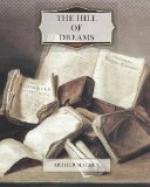There were stranger things written in the manuscript pages that Lucian cherished, sentences that burnt and glowed like “coals of fire which hath a most vehement flame.” There were phrases that stung and tingled as he wrote them, and sonorous words poured out in ecstasy and rapture, as in some of the old litanies. He hugged the thought that a great part of what he had invented was in the true sense of the word occult: page after page might have been read aloud to the uninitiated without betraying the inner meaning. He dreamed night and day over these symbols, he copied and recopied the manuscript nine times before he wrote it out fairly in a little book which he made himself of a skin of creamy vellum. In his mania for acquirements that should be entirely useless he had gained some skill in illumination, or limning as he preferred to call it, always choosing the obscurer word as the obscurer arts. First he set himself to the sever practice of the text; he spent many hours and days of toil in struggling to fashion the serried columns of black letter, writing and rewriting till he could shape the massive character with firm true hand. He cut his quills with the patience of a monk in the scriptorium, shaving and altering the nib, lightening and increasing the pressure and flexibility of the points, till the pen satisfied him, and gave a stroke both broad and even. Then he made experiments in inks, searching for some medium that would rival the glossy black letter of the old manuscripts; and not till he could produce a fair page of text did he turn to the more entrancing labor of the capitals and borders and ornaments. He mused long over the Lombardic letters, as glorious in their way as a cathedral, and trained his hand to execute the bold and flowing lines; and then there was the art of the border, blossoming in fretted splendor all about the page. His cousin, Miss Deacon,




